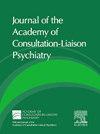Taking an Evidence-Based Approach to 10 Common Myths About Catatonia: An Educational Review
IF 2.5
4区 心理学
Q2 PSYCHIATRY
Journal of the Academy of Consultation-Liaison Psychiatry
Pub Date : 2025-07-01
DOI:10.1016/j.jaclp.2025.05.008
引用次数: 0
Abstract
Catatonia is a serious neuropsychiatric disorder associated with considerable morbidity and mortality. Despite growing interest in the disorder and the field's advancing understanding, a gap between research and clinical practice persists. This is particularly problematic as prompt recognition is essential to optimal management and improving outcomes. We present an educational review of 10 common myths regarding the recognition, etiology, phenotype, and management of catatonia. We address each myth using an evidence-based approach. A few salient considerations include the broad age range affected by catatonia, the fact that patients with catatonia often have preserved awareness of their surroundings, and the importance of using a validated catatonia screening instrument for reliable identification. By addressing these 10 myths, we aim to reduce the gap between evidence and clinical practice to ultimately improve the care and clinical outcomes of people with catatonia.
以证据为基础的方法探讨关于紧张症的十个常见误解:一项教育回顾。
紧张症是一种严重的神经精神疾病,具有相当高的发病率和死亡率。尽管人们对这种疾病的兴趣越来越大,对该领域的理解也在不断进步,但研究与临床实践之间的差距仍然存在。这尤其成问题,因为及时识别对于优化管理和改善结果至关重要。我们提出了十个常见的神话关于认识,病因,表型和管理紧张症的教育回顾。我们用基于证据的方法来解决每个误区。一些突出的考虑因素包括受紧张症影响的广泛年龄范围,紧张症患者通常保持对周围环境的意识,以及使用经过验证的紧张症筛查工具进行可靠识别的重要性。通过解决这十个误解,我们的目标是减少证据和临床实践之间的差距,最终改善紧张症患者的护理和临床结果。
本文章由计算机程序翻译,如有差异,请以英文原文为准。
求助全文
约1分钟内获得全文
求助全文
来源期刊

Journal of the Academy of Consultation-Liaison Psychiatry
Psychology-Clinical Psychology
CiteScore
5.80
自引率
13.00%
发文量
378
审稿时长
50 days
 求助内容:
求助内容: 应助结果提醒方式:
应助结果提醒方式:


